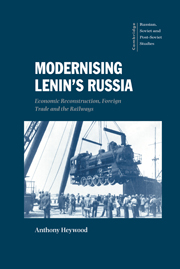Book contents
- Frontmatter
- Contents
- List of illustrations
- List of tables
- Acknowledgements
- Technical note
- List of abbreviations and acronyms
- Introduction
- PART I Towards economic reconstruction, 1917–1920 the birth of the railway imports policy
- PART II Trade and isolation, 1920–1921 implementing the railway imports policy
- PART III Retreat, 1921–1924
- 6 The new order
- 7 Denouement
- Conclusion
- Notes
- Bibliography
- Index
- Cambridge Russian, Soviet and Post-Soviet Studies
- Plate Section
6 - The new order
Published online by Cambridge University Press: 14 August 2009
- Frontmatter
- Contents
- List of illustrations
- List of tables
- Acknowledgements
- Technical note
- List of abbreviations and acronyms
- Introduction
- PART I Towards economic reconstruction, 1917–1920 the birth of the railway imports policy
- PART II Trade and isolation, 1920–1921 implementing the railway imports policy
- PART III Retreat, 1921–1924
- 6 The new order
- 7 Denouement
- Conclusion
- Notes
- Bibliography
- Index
- Cambridge Russian, Soviet and Post-Soviet Studies
- Plate Section
Summary
After a brief visit to Russia in May 1921, William Peters, shortly to become Assistant Agent at the British government's Trade Mission in Moscow, reported to the Department for Overseas Trade that ‘the past two months have been marked by a complete change in the Soviet internal economic policy’. It was principally the work of Lenin, who was arguing that Russia's salvation depended on improving the peasants' lot by allowing them to trade surplus produce. This meant, explained Peters, that the Soviet government was encouraging some measure of capitalism, though in specific forms amenable to state control.
This New Economic Policy, which was launched by the Tenth Party Congress in March 1921, represented a momentous and controversial change. Only reluctantly did Lenin and his Politburo colleagues concede its necessity, fully realising how unpopular it would be among rank-and-file party members. Trenchant opposition had to be overcome both within the Central Committee and at the Congress, especially from the Commissar of Food Procurement, A. D. Tsiurupa. One Congress delegate bitterly assessed the new grain policy as ‘capitulation before the petite bourgeoisie’. Abroad, there were some correspondingly cheerful verdicts. In Britain, for example, Lloyd George described the NEP as ‘an admission of the complete failure of the Communist system’; the Review of Reviews assessed it as ‘the abandonment of Communism’; and the New Statesman proclaimed in the autumn that the ‘Communistic experiment had failed’.
- Type
- Chapter
- Information
- Modernising Lenin's RussiaEconomic Reconstruction, Foreign Trade and the Railways, pp. 163 - 199Publisher: Cambridge University PressPrint publication year: 1999

